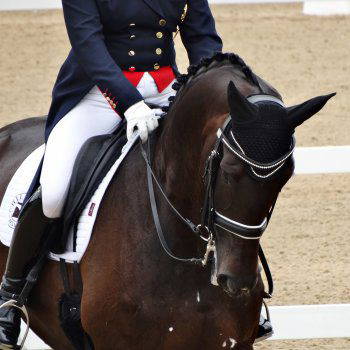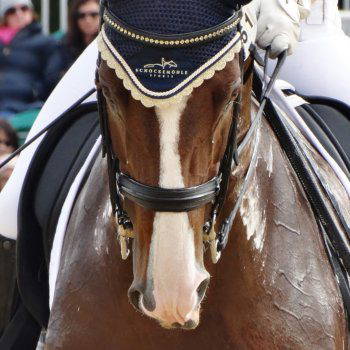My name is Robyn and I am a 26 year old dressage enthusiast and keen photographer, I also live with Asperger’s Syndrome – a form of high-functioning autism. I was thrilled to hear of the recent news that a new affiliated dressage championship for those with “Intellectual Disabilities” hosted by British Dressage and the Riding for the Disabled Association (RDA). I feel this is a positive step in the right direction and I applaud those who got this idea off of the ground, but there is room to take this further.
 I have very kindly been offered this platform by Genius Equestrian and I would like to use it to explain what it feels like for a person with an invisible disability to be involved with horses. In doing so I hope to raise awareness and understanding as to why I feel that the Para-Equestrian disciplines should introduce an “ID Classification”. I appreciate that I cannot speak for all but the following examples are taken from my own experiences:
I have very kindly been offered this platform by Genius Equestrian and I would like to use it to explain what it feels like for a person with an invisible disability to be involved with horses. In doing so I hope to raise awareness and understanding as to why I feel that the Para-Equestrian disciplines should introduce an “ID Classification”. I appreciate that I cannot speak for all but the following examples are taken from my own experiences:
- Before even arriving at a yard, a battle with the mind has already begun. The anxiety experienced can be overwhelming, so much so that many a time I have broken down into tears for fear of doing something wrong or the people I will have to face. I would go and have the lesson anyway but this process will often repeat itself.
- This anxiety doesn’t stop once in the saddle, it will manifest itself into tension. My muscles would tense and my riding position would suffer, as a result the horse would feel this tension and its performance would suffer too. Having a coach/trainer/instructor that is understanding and has patience is essential to work through this.
- Perhaps one of the most defining characteristics of my particular condition: Sensory Issues – I perceive the world slightly differently and some of senses react to stimuli stronger than others. Too much exposure can cause a Sensory Overload. For example I am sensitive to sounds and smells; the smell of a fresh arena surface can distract and distress me, or if the music from the speaker system is too loud it can cause me physical pain. To some people these occurrences won’t be issues but to those like me they can be over-powering and will require time to adjust to.
- Having to maintain control over the anxiety for a period of time, such as a lesson or a competition, will be mentally exhausting as well as physically. It is not uncommon for me to take myself off to a quiet place to reflect and “recharge” without any social interaction. For those like me engaging in conversation requires a lot of effort – trying to read social cues or facial expressions, or understand a tone of voice correctly while also attempting to keep a conversation going can be very draining. A great activity for “recharging” around horses is grooming, we are able to safely regain composure without feeling judged that we struggle with eye contact or confuse our words due to anxiety.
 It is hard to put into words just how much Asperger’s affects me and my condition is described as mild and high-functioning. After just a few examples you must be asking, “Why would you want to do dressage?” For me the answer is simple, it agrees with how my brain functions. Dressage is my passion, my obsession, my “special interest” as the professionals call it. A brain like mine thrives on routine and on gaining as much knowledge as I can in my area of interest. In fact, a lack of contact with horses affects me more in the long run; my confidence and self-esteem plummets and I can become frustrated with myself as I have no outlet for my passion.
It is hard to put into words just how much Asperger’s affects me and my condition is described as mild and high-functioning. After just a few examples you must be asking, “Why would you want to do dressage?” For me the answer is simple, it agrees with how my brain functions. Dressage is my passion, my obsession, my “special interest” as the professionals call it. A brain like mine thrives on routine and on gaining as much knowledge as I can in my area of interest. In fact, a lack of contact with horses affects me more in the long run; my confidence and self-esteem plummets and I can become frustrated with myself as I have no outlet for my passion.
As I have said before I cannot speak for everyone, disabilities such as these are individual in the way they affect us, but I hope I have been able to give you an idea as to why I feel an Intellectual Disability Classification is needed in the Para-Equestrian disciplines. Just because my condition is described as ‘mild’ doesn’t mean it isn’t debilitating to live with – not all disabilities are visible. Those like me want to be included and accepted, I am not ashamed of my condition or who I am.
Search
Recent Articles
- The Good, The Bad and The Ugly of Coaching
- Does your horse need more energy, especially when competing?
- Grade 1 International Para Dressage Rider Di Green- Why Lexi Needed a Year Off
- Louise Blanch – Driving Towards New Horizons with the Continued Support of the Para Equestrian Foundation.
- Kissing Spine – Prevention or Cure?
Categories
- Advice Hub
- Athlete
- Carriage Driving
- Dentistry
- Dressage
- Endurance
- Eventing
- Farrier
- Featured
- Featured Horse Ads
- Featured Posts
- Horse Racing
- Horse's Mouth
- Horseball
- Hunting
- Le Trec
- Leisure Riders
- Mounted Games
- Nutrition
- Polo
- Polocrosse
- Reining
- Rescue & Rehabilitation
- Show Jumping
- Showing
- Tack Room
- Team Chasing
- The Pony Club
- Therapy
- Training
- Vaulting
- Veterinary




